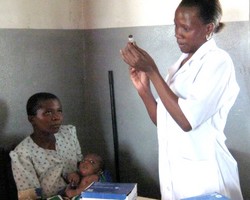New mother and newborn health study in Africa
Infant mortality (0-28 days) accounts for more than half of the deaths among children under five years of age. The largest number of maternal and infant deaths occurs in sub-Saharan Africa. Until now, postpartum services for women and newborns remain poorly defined, with missed opportunities for improved care. The MOMI (Missed opportunities in maternal and infant health: reducing maternal and newborn mortality and morbidity in the year after childbirth through combined facility- and community-based interventions) project has changed this situation. MOMI has designed and implemented interventions that have the potential to improve postpartum care (PPC) in selected rural health districts in Africa. The interventions are context-specific, agreed upon, feasible, sustainable, acceptable and built on evidence-based medicine and management. The study involved four districts: Kaya district (Burkina Faso), Kwale district (Kenya), Ntchisi district (Malawi) and Chiúta district (Mozambique). During the first three years of the project, a cross-country analysis of maternal and new-born health policies and services was conducted and interventions designed, selected and implemented. African research partners closely involved health authorities and policymakers in the process. Stakeholders' causal analysis workshops were organised in each of the respective countries at the start of the project. Based on the baseline assessment results, local stakeholders together with the MOMI national and international researchers designed and selected context-specific interventions aiming to optimise PPC at the four study sites. Community interventions varied across the sites but their primary objective was to strengthen the linkage between the community and the formal health system. Common interventions were integration of routine PPC with infant services such as vaccination; increasing uptake of PP family planning. The main achievement has been the finalisation of maternal and new-born health assessment and the design, selection and implementation of context-specific packages of PPC interventions between 18 to 24 months. Assessment results are available in individual country reports as well as comparative cross-country reports. Evaluation of MOMI showed that PPC for mothers is a more prominent topic in the district and national health policy agendas and action plans. Furthermore, MOMI PPC interventions have become embedded in the packages of services provided by the government-organised health services. It is expected that this will increase the sustainability of intervention implementation after the end of the project link to the Final Evaluation of the MOMI Project(opens in new window).







